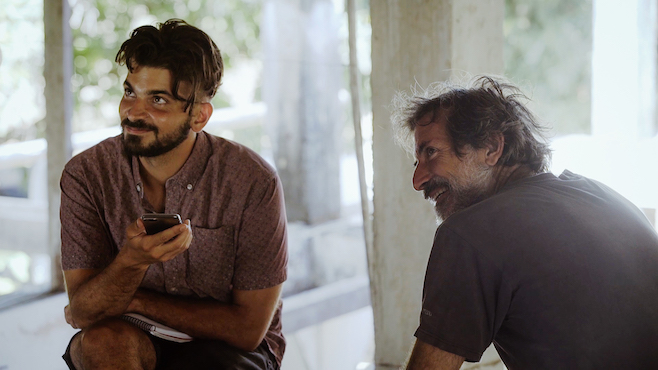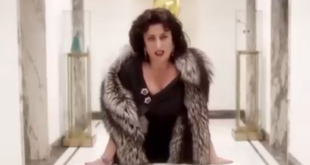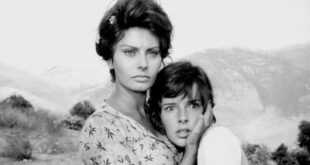A fascinating documentary that premiered at the 2020 Visions de Réel festival has recently become available on the streaming platform PROJECTR, which can be accessed for free through your public library or university.
“El Father Plays Himself” is a film about the making of a film. Director Mo Scarpelli followed Jorge Thielen Armand through the country’s Amazon jungle as the Venezuelan director shot his film, “La fortaleza.” Inspired by the real-life story of Armand’s eccentric father, Jorge Roque Thielen, the young filmmaker cast his own dad in the lead role. Scarpelli chronicles the tumultuous film set and emotional journey of getting the film shot, which proved to be no small feat.
This deeply intimate portrait of the relationship between a father and son is an emotional rollercoaster recalling the past while bringing to light heartaches, trials and triumphs. Thielen comes off as a man who has tried to do the right thing in life but has at times lost his way. He is a free-spirited, wild-at-heart character who loves his family but has been forced to deal with his own demons. Among them is alcoholism, a lifelong battle that still gets the best of him.
Perhaps the most striking element of the film is Armand’s calm demeanor in the face of the extreme chaos on the set. It’s a personality trait Thielen clearly appreciates. In the midst of his own drama and emotional breakdowns, he can always turn to his son for stability. His son has become his rock because he understands that his father loves him despite everything. Thielen knows this and feels loved. This is what is so touching about their relationship and it was beautifully captured by Scarpelli.
Among the most poignant scenes is a conversation between a makeup artist and Thielen when she asks him questions about his relationship with his son. It was one of many brutally honest moments of the film.
“What kind of father were you really?”
“I did everything you shouldn’t do with a son.”
“Has Jorge always been this calm?”
“Well, I really don’t know him in his daily life.”
The quality I appreciate most in this film is how it takes you into another world but at the same time, makes you reflect and equate the story to your own life and circumstances. Watching this father/son relationship as it unfolds will lead you to reflect on your own relationship with your father. The film stays with you long after it ends, which is why I felt the need to contact the director to talk with her about the compelling story and technicalities of shooting a documentary in the middle of the Amazon rainforest. She was very gracious and generous with her time in answering all of my questions.
FRA NOI: First, how did you meet the director and his father, how did this documentary come about?
MO SCARPELLI: Jorge is my fiancé; we met at the Berlinale in 2018. When Jorge decided to go back to Venezuela to make his film “La Fortaleza,” I asked if I could come along — to meet his family, to get to know a place I had secretly been dreaming about going to since I first saw pictures as a kid, to learn Spanish, to see how he ran a narrative film set (I had never been on one; my docs have had fictional elements but never full sets). Jorge asked, since I was going anyway, if I wanted to shoot a “making of” of his film production, as it had many precarious elements like securing uncontrolled locations in illegal gold mines; working in Venezuela when the country was experiencing a complete economic collapse; filming with his enigmatic and unpredictable father. I loved Les Blank’s “Burden of Dreams,” so said, sure. But when we got to Venezuela, I found I was completely bored by the external dramas of making a fiction film. I didn’t care about lights and cameras and permissions to shoot in locations… then I met Father. He didn’t care about that stuff either. He started training to be the lead actor. I watched as him learn to channel his real emotions into scenes his son had written, I saw and felt a sort of deep unrest inside Father which he seemed ready to put out there for and with his own son — then I saw the film I actually wanted to make. One focused on a father/son relationship which has been flipped on its head by the cinematic process, and how far they would take one another in that, and what that might reveal to me about the human being.
FN: There are moments when your camera seems to influence scenes. For example, in the office before the shoot started when Father was upset about his contract and then in the restaurant when he was happy but seemed conscious of being filmed.. Do you think that your presence and the filming of your documentary influenced his behavior in regard to his performance on and off the set?
MS: I think it’s more that Jorge (director) never really forgets about my presence because he and I are very close before/without the camera. So, there is a consciousness there which is hard for him to not have, about me. Father is different – we formed a relationship with the camera, and I think Father largely was himself and quite easily forgot about the camera. My camera influenced Jorge more, which is interesting, because he himself likes to try to get those in front of his camera to be “natural” but he had a hard time feeling uninhibited in that way.
FN: The makeup artist mentioned Jorge’s calm demeanor. I noticed this right away about him. What impressed me is that he maintained his calm throughout everything. Do you have insight into how he prepared himself emotionally ahead of filming?
MS: Honestly, Jorge is just like this as a person. It’s shocking to me sometimes, and was while I was shooting “El Father” because it’s very foreign to me, to non-react to strong things being thrown at you. We have a joke that someday, he’ll snap and throw a chair on set. But he doesn’t. When he’s upset, he internalizes; he turns inward; and as a director of a film trying to hold everything together, I think he was even more cautious than he would be in life because he wanted to make sure he could actually see this film through with his father.
FN: I’m wondering how he remained so calm in the face of so many emotions at play. I’m also wondering if seeing his father so intoxicated, even when it was part of the scene, had any impact on him in the moment. He really seemed to take everything in stride.
MS: What I learned with time is that Jorge is used to his father, he knows his father very well for not having spent most of his life with him. He kind of knows what to expect, and to also roll with the unexpected, because it has always been that way. He never said this out loud to me; it’s something I learned over kind of studying him in “El Father.”
FN: What did you want to tell or show about their relationship through the way you shot them, often focusing on one with the other in sight, catching some tender moments during the chaos?
MSI think family is incredible; whether we love or hate them, family is our best chance to be known. We take so many liberties; we become so raw; we stay so much who we were as children with our families because they have that historical knowledge of us that no one else in the world does or can, no matter how hard they try. This is thorny. It hurts, too, because we see our worst selves in the way we treat our family sometimes, in the places we push our family to go. I discovered in Jorge and Father a very peculiar father/son relationship, one that was strained but also deeply emotional for both men; they are the most important men to each other, and yet they let each other down (or have) in a lot of ways too. Then, they introduced this peculiar mechanism called cinema, which was a means to explore and push each other, and so my intention was to study and try to truly see where this could take them. The film took them across a spectrum (sometimes snapping quickly across that spectrum) of chaos to tender. That is who we are and what we are capable of — snapping all over the place, being dichotomies and contradictions — when we place ourselves at the center of a mechanism (cinema) that rewards raw emotion.
FN: Would you describe the atmosphere on set especially during the emotionally charged scenes? Just from watching, I could sense a heavy silence. The crew seemed to be really moved emotionally by what they had just witnessed.
MS: Well, hopefully you can feel in the film exactly what it felt like – that was my intention. I can say it was too much for some folks, but also that the crew was very patient, brave and willing to let the film go there, too. It was a group-think around aiming for emotional honesty and Father took that very far.
FN: I imagine that you had a ton of footage. Can you tell me something about your editing process? Did you have the documentary mapped out in your head before editing?
MS: Yes, I shoot a lot because I wait a long time for people to kind of betray themselves through the lens. That said, I know pretty immediately what is important to use and what isn’t, so there’s about 2 Terabytes of footage my editor and I didn’t even consider because I knew it wasn’t relevant / working towards the central questions I wanted to explore in the film. We edited fast; Juan Soto, my editor, is brilliant. We had a rough cut within 3 weeks – and the first week of that was us watching footage and talking only (not cutting anything yet).
To subscribe to Projectr and view this film, click here.
For updates on both films, follow the filmmakers on social media @fatherplaysdoc (Facebook, Twitter and Instagram.
 Fra Noi Embrace Your Inner Italian
Fra Noi Embrace Your Inner Italian







